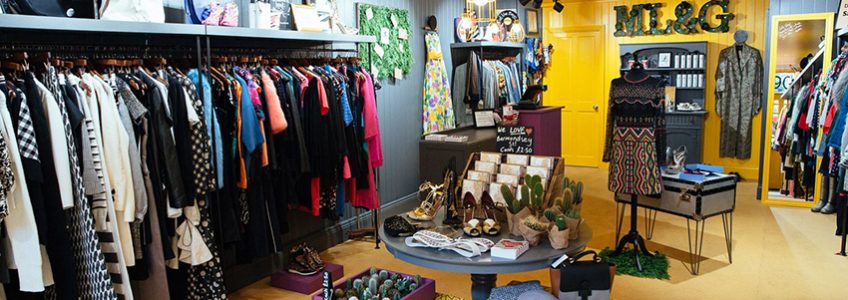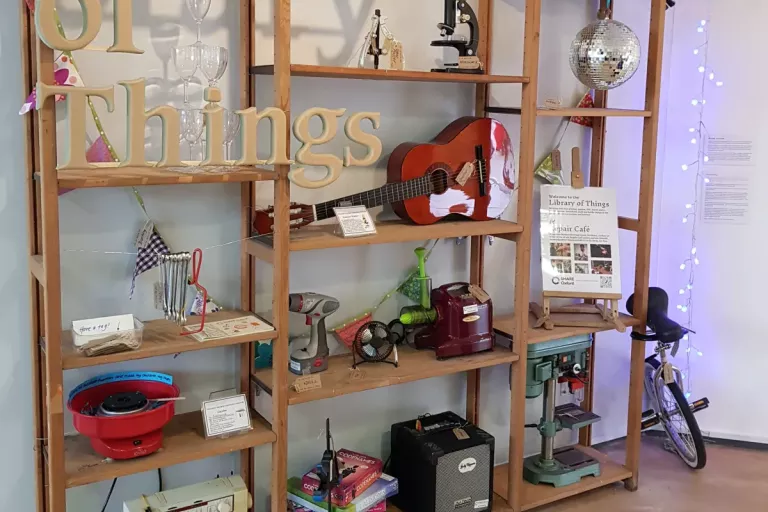Second-hand September

What is Second-hand September?
Second-hand September is a challenge started by Oxfordshire-based charity Oxfam to encourage everyone to buy only pre-owned items for the 30 days in September.
It’s good for the climate as it extends the life of items, thereby reducing the consumption of resources needed to create new items. It also saves buyers money as pre-owned items tend to be cheaper. And if you’re buying from a charity shop you are also donating to a good cause. Win-win-win.
It takes raw materials, water and energy to create every item we bring into our homes – whether it’s a T shirt, a cuddly toy or a toaster.
Its journey will have created carbon dioxide as it was transported from its original factory to a shop or online warehouse and then to your home.
In the circular economy, the idea is that we keep them in use for as long as possible, getting the maximum benefit of the resources used to make them.
Where to buy secondhand
According to the Charity Retail Organisation there are more than 11,200 charity shops in the UK so plenty to choose from. You can use the site’s look up facility to find the shops closest to you selling what you want eg vintage, furniture, electricals.
There are online charity shops and person-to-person online purchasing opportunities such as Ebay, Facebook marketplace, Gumtree, Preloved and Vinted.
Buying, selling and donating is a way of extending the life of items you no longer want whether it’s clothes or home décor, toys, games, books or electronics.
Clothing
Fast fashion – where clothes are produced in high volume and relatively low cost to the consumer is damaging our planet as production uses up precious resources to create items that are soon thrown away.
According to waste charity WRAP, it is estimated that people in the UK discard around 711,000 tonnes of textiles into black bins and general waste at Household Waste Recycling Centres. This is the equivalent of almost 30,000 shipping containers full of cast-off fashion and home textiles items a year.
Second-hand September is a way of doing our bit as individuals to make our lives more sustainable.
Pippa Siret-Godfrey runs Preloved Clothing Sale based in Abingdon. She has partnered with community action group One Planet Abingdon to host organised sales of pre-owned clothes at central venues where sellers create mini stalls with racks of second-hand clothes and shoes that buyers can browse as they would in a shop.
Pippa said: “A lot of people buy and sell at car boot sales but it is difficult to present your clothes nicely – they are often laid out on the ground or on a table so sellers end up selling good stuff cheaply and buyers don’t get the feeling the items are looked after.
“Preloved Clothing Sales all have racks and presented like lots of mini shops in one hall. The items tend to be higher quality and then people can charge fairer prices.”
She holds Preloved Clothing Sales every quarter in Abingdon with around 30 stalls attended by around 250 people the last event at the town hall in July.
Pippa’s top tips for buying second-hand clothing
- Firstly, look for fabrics and colours that you like first and don’t just judge on sizes. Different brands have different sizing and vintage items sizes might not correspond to modern sizing. See what you like first and then see if it fits.
- Check clothing for rips, missing buttons and that zips work. All of which can be disappointing if you only discover when you get something home. And if you are buying online ask if there are any flaws? (On the other hand if you really like something and you are capable of replacing zips, buttons, make minor alterations or repairs etc then you could ask for discount)
- Set a budget, but be realistic, charity shops and online sellers will expect more per item than at car boot sales.
- When sorting your clothes for selling or donating think about the time of year, winter coats will be most sought after in Autumn, summer outfits in Spring etc
- One in – One out. I have a rule that if I buy one thing, then something else has to go. This means my wardrobe doesn’t get overcrowded and also I think carefully about each addition as it means goodbye to something else.
Household items
Most charity shops have second-hand household items, from coffee machines to crockery and cutlery. There are also some which specialise in furniture. This is in addition to small shops which sell second-hand furniture and the previously mentioned online marketplaces.
Make do and mend
Many items including clothing, homeware, toys and electrical goods can be repaired rather than binned. There are regular repair cafes all over Oxfordshire where people with the right skills help those who have something that needs rescuing. Find out more on the Repair Cafe Oxfordshire website.
Don’t buy, just borrow
A library of things is where you can borrow or hire items you need rather than buying new. It works especially well for those items that you use rarely and take up a lot of space. Jet wash your patio once a year? Need a gazebo for a party?
The Climate Assembly made a report to the UK government in which it recommended people should repair goods and share more, instead of owning all their appliances.
This saves people money, storage space and also helps fight climate change by reducing material and manufacturing waste.
There are now libraries of things in the following places around Oxfordshire:
- Abingdon- Oxford Wood Recycling offers tools
- Bicester - Bicester Green
- Didcot - Sustainable Didcot is planning to open a Library of Things in September 2024.
- Kidlington - Oxford Party Library hire party gear eg tents, gazebos, bunting, reusable serving dishes and much more.
- Marston - Marston eco hub also offers gardening equipment
- Oxford - SHARE Oxford
- Wantage - Sustainable Wantage has a library of things
- Witney - Witney eco party kit offers reusable party equipment for a fee
Sustainable Didcot is planning to open a Library of Things in the town this month.
